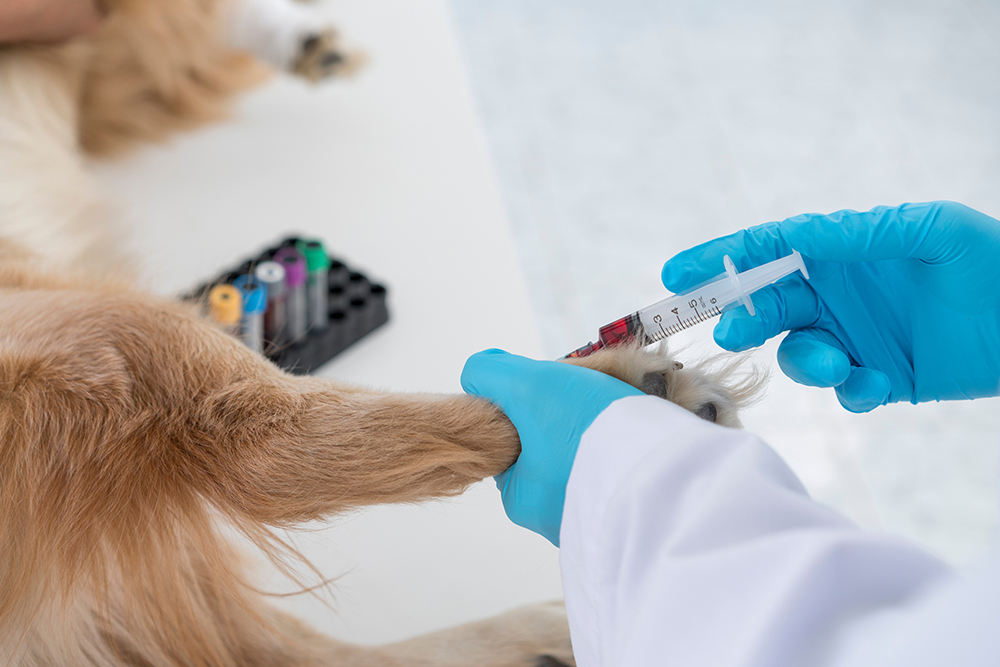Unlocking Your Pet’s Health Secrets: The Importance of Annual Bloodwork for Early Disease Detection
At Boca Midtowne Animal Hospital, we know how important your pet’s health is to you. As a pet owner, you’re committed to providing the best care possible—but understanding what your pet needs at each stage of life can feel overwhelming. One of the most valuable yet often overlooked tools in preventive veterinary care is annual bloodwork.
Routine blood testing plays a vital role in identifying health concerns before they become advanced or symptomatic. In this guide, we’ll explore why annual bloodwork is essential, what it reveals, and how it helps support your pet’s long-term wellness.
Why Annual Bloodwork Matters
Pets are skilled at masking signs of illness. By the time visible symptoms appear, the condition may already be advanced. Annual bloodwork helps detect these silent health threats early, allowing for timely intervention and more effective treatment.
Because pets age faster than humans, their internal health can change rapidly—even within a year. Incorporating routine blood testing into your pet’s annual wellness visit is one of the most effective ways to ensure a longer, healthier life.
To better understand the role of regular vet visits, we recommend reviewing Why Are Regular Veterinary Visits Important?
What Annual Bloodwork Includes
Bloodwork is a simple but powerful diagnostic tool. A standard panel typically includes:
Complete Blood Count (CBC)
Evaluates overall health and detects conditions like anemia, infection, and inflammation.
- Red Blood Cells (RBCs): Assess oxygen-carrying capacity.
- White Blood Cells (WBCs): Indicate immune system activity or infection.
- Platelets: Help identify clotting disorders.
Chemistry Panel
Measures organ function and metabolic status:
- Kidney Values (BUN, Creatinine): Detect early kidney disease.
- Liver Enzymes (ALT, AST, ALP): Show how the liver processes nutrients and toxins.
- Blood Glucose: High or low levels may signal diabetes or other conditions.
- Electrolytes (Sodium, Potassium, Chloride): Help assess hydration, heart function, and acid-base balance.
- Proteins (Albumin, Globulin): Evaluate immune status and liver function.
For a full breakdown of these and other diagnostic tests, refer to the Types of Veterinary Medical Tests – Merck Veterinary Manual.
What Bloodwork Can Detect
Blood tests can detect a wide range of health issues—many before any symptoms are visible. Here are some of the most common:
Kidney Disease
Early-stage kidney disease can be detected through elevated BUN and creatinine levels. Timely management can help slow disease progression and improve quality of life. Learn more at Chronic Kidney Disease in Cats – Cornell Feline Health Center.
Liver Disease
Changes in liver enzymes can indicate inflammation, infection, or liver failure. Early diagnosis allows for dietary changes, medication, and lifestyle management.
Diabetes
Elevated glucose levels are one of the most common signs of diabetes. Early detection helps prevent complications and improves long-term outcomes. Learn more at Not So Sweet: Diabetes in Pets – AAHA.
Thyroid Disease
- Hypothyroidism in Dogs: Results in lethargy, weight gain, and skin changes. Diagnosed through thyroid hormone (T4) testing. Hypothyroidism in Dogs – Cornell University
- Hyperthyroidism in Cats: Causes weight loss, increased appetite, and restlessness. Feline Hyperthyroidism Guidelines – AAHA
Bloodwork Based on Life Stage
Your pet’s age and lifestyle impact what kind of bloodwork is most appropriate:
- Puppies and Kittens: Establish baseline values and check for congenital abnormalities.
- Adult Pets: Annual testing to monitor changes over time and catch early disease.
- Senior Pets: More frequent testing (every 6 months) to monitor chronic conditions and age-related health issues.
See Preventive Testing for Senior Pets – Zoetis Petcare for more guidance on senior pet wellness.
What to Expect During a Bloodwork Appointment
Bloodwork is a quick and routine part of your pet’s wellness exam.
- Preparation: Fasting for 8–12 hours may be required, depending on the tests being run. Ask us first.
- Procedure: A small blood sample is collected, usually from the neck or leg. The process is quick and generally well tolerated.
- Results: Most results are returned within 1–3 days. We’ll call to review the findings and discuss any recommended next steps.
Frequently Asked Questions
Is annual bloodwork necessary if my pet seems healthy?
Yes. Many health issues don’t show symptoms until they are advanced. Annual bloodwork provides early warning signs.
Will the blood test hurt?
Most pets tolerate it well. The discomfort is brief and comparable to a routine vaccination.
Is bloodwork expensive?
The cost varies, but early detection can save money by avoiding more complex treatments down the line.
What happens if something abnormal is found?
We’ll explain the results clearly, recommend any follow-up testing, and outline treatment options if needed.
We’re Here to Help
At Boca Midtowne Animal Hospital, our mission is to make preventive care approachable, effective, and stress-free. We understand how important your pet’s health is to your family, and we’re here to be your partner in keeping them healthy.
If you’re due for your pet’s annual exam or have questions about bloodwork, contact us directly to schedule an appointment.
Let’s work together to give your pet the healthiest life possible.









Leave A Comment